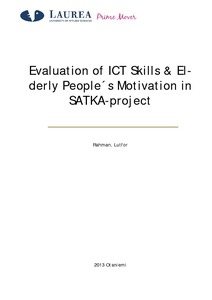Evaluation of ICT Skills & Elderly People’s Motivation in SATKA-project
Rahman, Lutfor (2013)
Rahman, Lutfor
Laurea-ammattikorkeakoulu
2013
All rights reserved
Julkaisun pysyvä osoite on
https://urn.fi/URN:NBN:fi:amk-2013060512938
https://urn.fi/URN:NBN:fi:amk-2013060512938
Tiivistelmä
The aim of this thesis was to evaluate ICT competences and elderly people’s motivation after SATKA- project’s computer training in the City of Helsinki.
SATKA (Seniorit ja syrjäytyneet atk-aikaan hanke) stands for “ICT age for digitally excluded people”. The target groups were the Finnish elderly, the immigrant elderly, the pensioners and the unemployed living in Helsinki region. In this project basic IT guidance provided in different social service centers, home care centers and elderly homes without any fee. The salaried IT instructors and the volunteer IT instructors were working in this project in different locations. The lack of ICT knowledge leads to an increased risk of marginalization of the elderly people in society. The aim of the project was to support older people to utilize their own strength in old age. The strategy also was to increase social inclusion of digitally excluded people and the elderly able to live at home for as long as possible with the help of assistive equipment. ICT skills are necessary for elderly people enable to cope with the digital world.
In this qualitative study the method used was face to face interviews with three elderly par-ticipants in the service centre settings regarding their training, Internet and computer us-age in daily life. All the participants were involved in SATKA-project as volunteer tutors or participants as learners. The interviews were analyzed through qualitative inductive content analysis. In this study the qualitative thematic interview was used for data collection in SATKA-project.
Based on the interviews, the participants developed in communication skills e.g. by sending emails, using Skype and acquiring writing skills in MS Word. Being involved in SATKA-project and the activities of the project helped the participants to develop skills and make everyday lives easier. The participants used their ICT skills to communicate with their friends and children. The participants felt good to have ICT competences. The Internet search was interesting and necessary for further learning in old age. The Internet increased social and intergenerational communication.
The elderly people need different kinds of skills even in the old age in order to active living. Learning ICT is an advantage of independent living for the elderly people. In this SATKA-project the elderly people showed a wide range of interest to acquire ICT competences and showed motivation of learning ICT.
Key words: ICT skills of the elderly, motivation of the elderly, ICT for immigrants, ICT education.
SATKA (Seniorit ja syrjäytyneet atk-aikaan hanke) stands for “ICT age for digitally excluded people”. The target groups were the Finnish elderly, the immigrant elderly, the pensioners and the unemployed living in Helsinki region. In this project basic IT guidance provided in different social service centers, home care centers and elderly homes without any fee. The salaried IT instructors and the volunteer IT instructors were working in this project in different locations. The lack of ICT knowledge leads to an increased risk of marginalization of the elderly people in society. The aim of the project was to support older people to utilize their own strength in old age. The strategy also was to increase social inclusion of digitally excluded people and the elderly able to live at home for as long as possible with the help of assistive equipment. ICT skills are necessary for elderly people enable to cope with the digital world.
In this qualitative study the method used was face to face interviews with three elderly par-ticipants in the service centre settings regarding their training, Internet and computer us-age in daily life. All the participants were involved in SATKA-project as volunteer tutors or participants as learners. The interviews were analyzed through qualitative inductive content analysis. In this study the qualitative thematic interview was used for data collection in SATKA-project.
Based on the interviews, the participants developed in communication skills e.g. by sending emails, using Skype and acquiring writing skills in MS Word. Being involved in SATKA-project and the activities of the project helped the participants to develop skills and make everyday lives easier. The participants used their ICT skills to communicate with their friends and children. The participants felt good to have ICT competences. The Internet search was interesting and necessary for further learning in old age. The Internet increased social and intergenerational communication.
The elderly people need different kinds of skills even in the old age in order to active living. Learning ICT is an advantage of independent living for the elderly people. In this SATKA-project the elderly people showed a wide range of interest to acquire ICT competences and showed motivation of learning ICT.
Key words: ICT skills of the elderly, motivation of the elderly, ICT for immigrants, ICT education.
